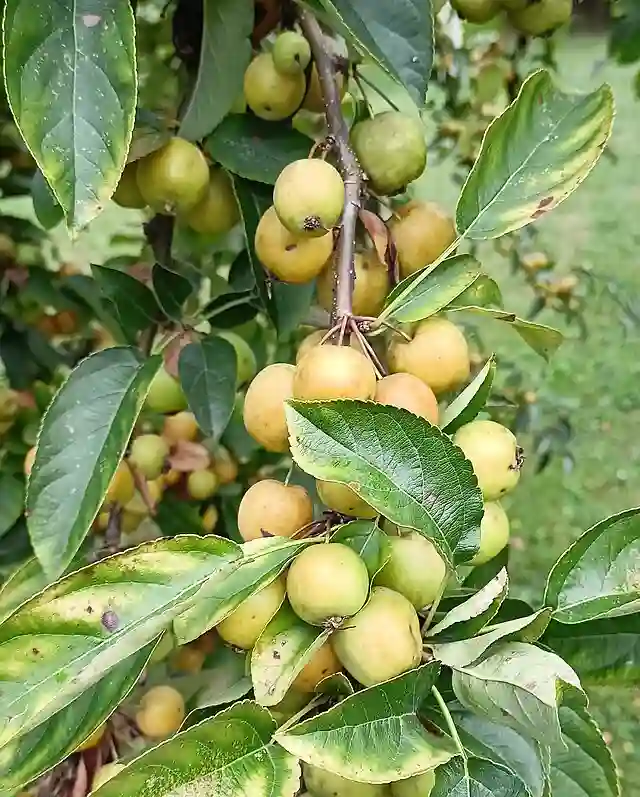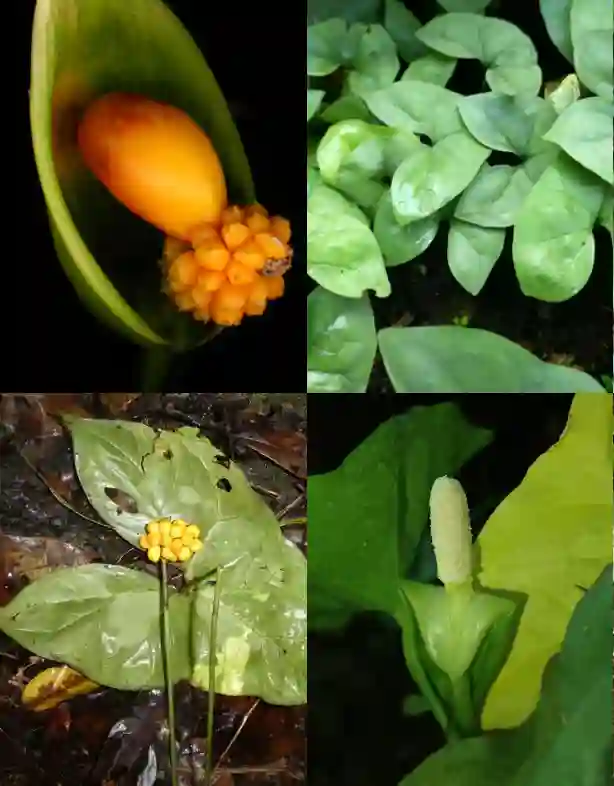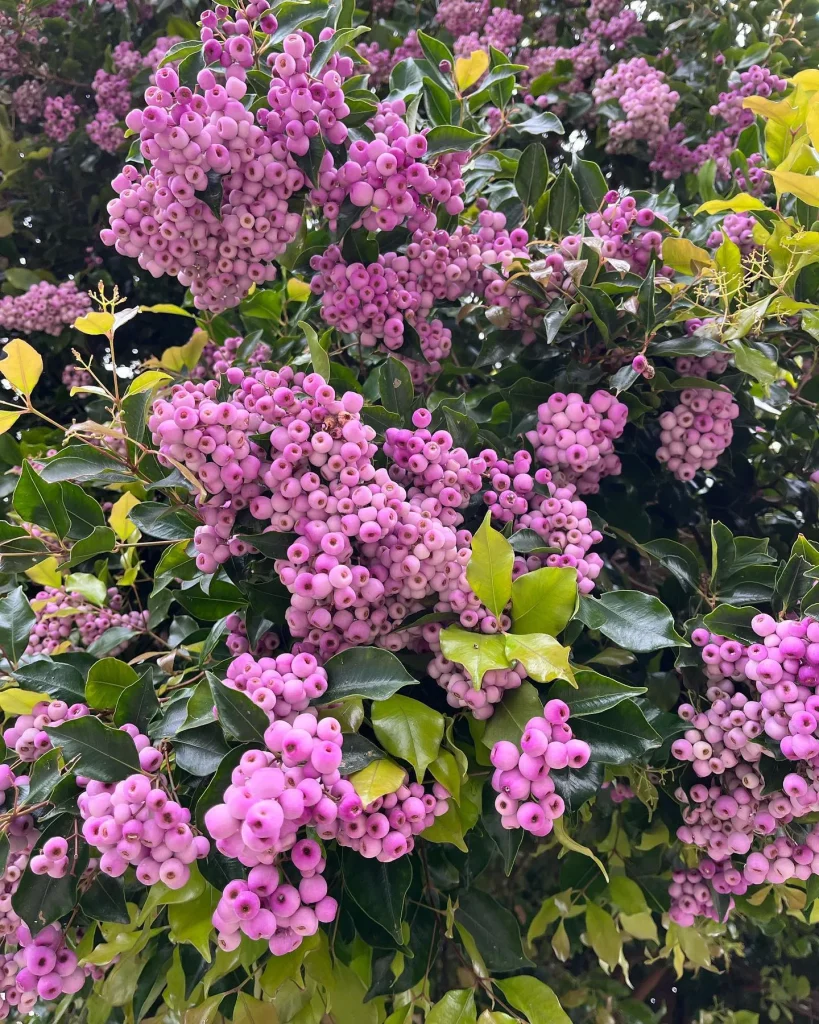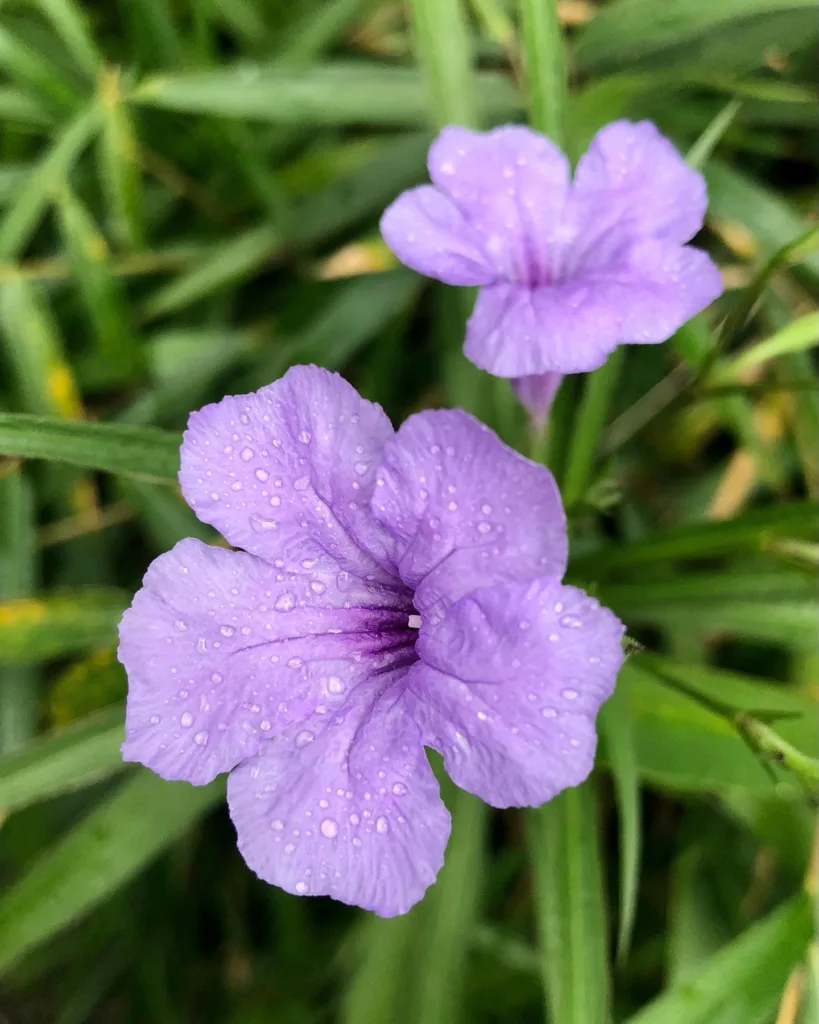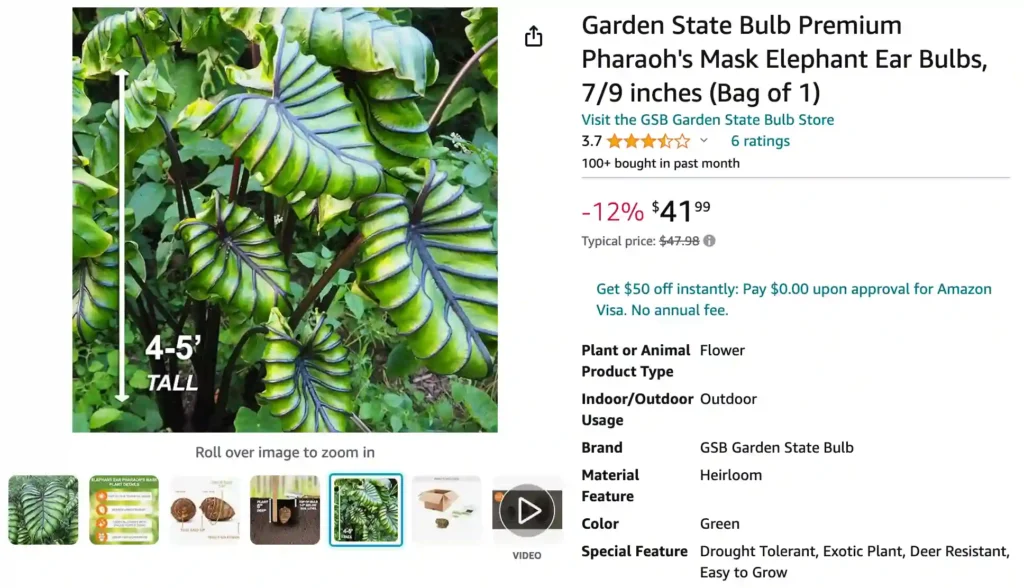
1. Introduction to Colocasia Pharaoh’s Mask: The Ancient Enigma
1.1. What is Colocasia esculenta ‘Pharaoh’s Mask’?
The Colocasia esculenta ‘Pharaoh’s Mask’ is a highly coveted and visually spectacular cultivar within the Colocasia genus, widely known as ‘Elephant Ear’. It is primarily celebrated for its dramatic and distinctive foliage: its large, heart-shaped to arrow-shaped leaves are a very dark green, almost black or purplish-black, beautifully contrasted by prominent, raised, light green to chartreuse veins that create a striking ribbed or corrugated effect. What truly sets it apart and gives it its evocative name is how these raised veins stand out, forming patterns that can resemble ancient Egyptian masks. This captivating morphology makes it a true showstopper and a prized addition to any indoor (or outdoor in warm climates) plant collection, offering an exotic and opulent aesthetic.
1.2. Reasons for its Appeal
Colocasia Pharaoh’s Mask captivates plant enthusiasts for several compelling reasons:
- Exceptional Veining & Texture: Its prominent, raised, light green veins create a unique ribbed or corrugated texture that is both tactile and visually stunning, contrasting dramatically with the dark leaf blade.
- Bold Foliage Color: Its very dark, almost black leaves provide a dramatic and sophisticated aesthetic.
- Unique Aesthetic: The “Pharaoh’s Mask” appearance gives it an intriguing and artistic presence.
- Collector’s Item: Due to its exquisite features and desirability, it is highly sought after by Aroid collectors.
- Statement Plant: Its large, impressive leaves offer significant visual impact and a lush, tropical presence.
2. Origins and Distinguishing Characteristics
2.1. Native Habitat
Colocasia esculenta (the species from which ‘Pharaoh’s Mask’ is a cultivar) is indigenous to tropical and subtropical regions of Southeast Asia and India. In its natural environment, it typically grows in moist, swampy areas, along riverbanks, or in shaded understories, thriving in conditions of high humidity, consistent warmth, and ample moisture. The ‘Pharaoh’s Mask’ cultivar is a cultivated selection prized for its unique raised veining and dark coloration. Understanding these native conditions is crucial for replicating an ideal growing environment.
2.2. Leaf Morphology and Coloration
The leaves of Colocasia Pharaoh’s Mask are its most defining characteristic. They are:
- Size: Large, ranging from 1-2 feet (30-60 cm) or more in length in optimal conditions.
- Shape: Typically large, heart-shaped to arrow-shaped (sagittate), with prominent basal lobes and a pointed apex.
- Color & Texture: A very dark green, almost black or purplish-black, base color. The defining feature is the prominent, raised, light green to chartreuse veins that create a striking, almost corrugated texture on the upper surface. The underside of the leaves may have a purplish tint.
- Sheen: The leaves have a glossy finish.
- The leaves are generally entire (undivided).
2.3. Growth Habit and Rate
Colocasia Pharaoh’s Mask is primarily a terrestrial Aroid. It grows from a central corm, forming a large, upright clump of leaves. It does not typically climb. It is a robust and vigorous grower under optimal conditions, rapidly unfurling new leaves that quickly achieve their impressive size and coloration. It can reach a mature height of 3-5 feet (0.9-1.5 meters) in gardens.
2.4. Toxicity
Like most other Colocasia species, Colocasia Pharaoh’s Mask is considered toxic to pets (cats, dogs) and humans if ingested. It contains calcium oxalate crystals, which can cause irritation and swelling of the mouth, throat, and digestive tract, leading to discomfort, vomiting, and difficulty swallowing. It is advisable to keep this plant out of reach of pets and small children.
2.5. Comparison to Similar Colocasia Varieties (Black Magic, Mojito, White Lava, Illustris)
Colocasia Pharaoh’s Mask is distinctive due to its combination of very dark leaves and prominent, raised light green veins. It is often compared to other dark-leafed or uniquely veined Colocasias.
- Colocasia esculenta ‘Pharaoh’s Mask’: Characterized by very dark (almost black) leaves with prominent, raised, light green to chartreuse veins, forming a ribbed/corrugated texture.
- Colocasia esculenta ‘Black Magic’: Features solid, very dark purple to black leaves with a velvety, matte finish. It lacks the prominent raised, light green veins and glossy texture of ‘Pharaoh’s Mask’.
- Colocasia esculenta ‘Mojito’: Has green leaves heavily mottled and speckled with dark purple/black splashes, creating a marbled effect, distinct from the uniform dark base and raised light veins of ‘Pharaoh’s Mask’.
- Colocasia esculenta ‘White Lava’: Features very dark (almost black) leaves with a central creamy white/yellow “lava flow” variegation along the veins. While it has prominent light veins, the pattern and color are distinct from ‘Pharaoh’s Mask’.
- Colocasia esculenta ‘Illustris’: Features green leaves with dark purplish-black veins and margins, and often a dark blotch in the center. Its veins are dark, not prominently light and raised, and its base color is green, not almost black.
The unique combination of its very dark leaves and the prominent, raised light green to chartreuse veining clearly distinguishes Colocasia Pharaoh’s Mask.
3. Comprehensive Care Guide: Nurturing Your Regal Elephant Ear
Cultivating a thriving Colocasia Pharaoh’s Mask demands meticulous and precise care to highlight its exquisite foliage and overall health, mimicking its tropical ancestry. This plant isn’t overly fussy, but it does have specific needs.
Table 1: Quick Care Guide for Colocasia Pharaoh’s Mask
| Care Factor | Requirement Description |
|---|---|
| Light | Bright, indirect light (e.g., East/North window). Avoid harsh midday sun. |
| Temperature | Ideal range: 18-27°C (65-80°F). Protect from sudden drops below 15°C (59°F) and frost (<0°C/32°F). |
| Humidity | High humidity (60% or more) preferred. Essential for pristine leaves. |
| Watering | Keep soil consistently moist but not soggy. Water deeply when top 1 inch of soil dries slightly. Ensure good drainage. Avoid overwatering. |
| Soil | Well-draining, fertile, airy potting mix (aroid mix, or potting mix + perlite/orchid bark). |
| Fertilization | Balanced liquid fertilizer, diluted by half, every 2-4 weeks in spring/summer. Reduce/withhold in fall/winter. |
| Pruning | Remove old/damaged leaves. Minimal pruning. |
| Repotting | Every 1-2 years, or when root-bound, in spring. Increase pot size slightly. |
| Support | Not typically needed (upright clump). |
3.1. Light Requirements
Bright, indirect light is paramount for Colocasia Pharaoh’s Mask to maintain its striking foliage coloration and prominent vein patterns, and to promote healthy growth. Place your plant near an east or north-facing window for ample ambient light (dappled sunlight). Avoid harsh midday sun, which can easily scorch its large, delicate leaves, leading to unsightly brown spots and potentially dulling its vibrant colors. For south or west-facing windows, use sheer curtains to filter the light or place the plant a few feet away from the window. Conversely, insufficient light can lead to slower growth, smaller leaves, and less prominent veining or coloration. Regularly rotating the plant ensures even light exposure and balanced growth.
3.2. Temperature and Humidity
As a plant from warm, humid tropical rainforests, Colocasia Pharaoh’s Mask prefers consistently warm temperatures, ideally ranging from 18-27°C (65-80°F). It’s crucial to protect it from cold drafts and sudden temperature fluctuations. Avoid placing the plant near open doors, air conditioning vents, or heating units. It is not frost-tolerant and should be brought indoors or protected when temperatures drop below 0°C (32°F). Even temperatures below 15°C (59°F) can stress the plant, halt growth, and cause leaf damage.
High humidity (60% or more) is preferred for Colocasia Pharaoh’s Mask. Optimal growth and pristine leaf appearance are achieved with higher moisture levels. Signs of insufficient humidity might include crispy brown leaf edges or tips, or new leaves struggling to unfurl properly. You can increase humidity by using a room humidifier. Grouping plants together or using a pebble tray filled with water (ensuring the pot itself doesn’t sit in the water) can also help create a more humid microclimate. Regular misting can provide a temporary boost.
3.3. Watering Practices
Proper watering is critical for Colocasia Pharaoh’s Mask. It prefers its soil to be consistently moist but not waterlogged. Water deeply when the top 1 inch (2.5 cm) of soil feels dry to the touch. Ensure that the pot has excellent drainage holes and that any excess water drains out completely from the bottom. Avoid soggy soil, which can lead to root rot. Overwatering is a common mistake for Colocasias.
The frequency of watering will depend on environmental factors like light, temperature, and humidity, as well as the pot size and soil mix. Expect to water more often during the warmer, active growing months (spring and summer), typically about once a week or more frequently in hot weather. During the cooler, dormant months of fall and winter, some Colocasias may enter a dormant period; if this happens, reduce watering frequency significantly, allowing the soil to dry out more thoroughly between waterings. Brown spots or drooping leaves can indicate overwatering.
3.4. Optimal Soil Mix and Repotting
A well-draining, fertile, and airy potting mix is essential for Colocasia Pharaoh’s Mask. This mimics the loose, organic matter it would find in its native environment. An ideal mix should promote good aeration while retaining sufficient moisture. A suitable blend, often referred to as an “aroid mix” or a mix formulated for African violets, can include:
- High-quality potting soil (approximately 50-60%)
- Perlite or pumice (approximately 20-30%) for excellent drainage and aeration
- Orchid bark (approximately 10-20%) for chunkiness and improved air circulation
- Compost or other organic matter for fertility
Repotting: Repot your Colocasia Pharaoh’s Mask typically every 1-2 years, or when you notice it has become root-bound (roots growing out of drainage holes, water running straight through the pot too quickly, stunted growth). Spring is the best time to repot, as the plant is entering its active growth phase. Choose a new pot that is only slightly larger (e.g., 1-2 inches larger in diameter) than the previous one, ensuring it has ample drainage. Use fresh potting mix.
3.5. Fertilization Strategies
During the growing season (spring and summer), fertilize your Colocasia Pharaoh’s Mask every two to four weeks with a balanced fertilizer, diluted to half strength. This provides the necessary nutrients to support vigorous growth and maintain its lush foliage and vibrant coloration. Reduce or completely stop fertilizing during the fall and winter months when the plant’s growth naturally slows or enters dormancy. Over-fertilization can lead to salt buildup in the soil, which can burn the roots and cause leaf damage (e.g., crispy brown tips). Always water the plant thoroughly before applying fertilizer to protect the roots.
3.6. Pruning and Maintenance
Regular pruning is beneficial for Colocasia Pharaoh’s Mask to maintain its appearance and remove any unhealthy foliage. Remove any yellowing, browning, or damaged leaves using clean, sharp scissors or pruning shears. Pruning can be done during the active growing season. Regularly wipe the leaves gently with a soft, damp cloth to remove dust, which improves the plant’s ability to photosynthesize and keeps the unique texture and vibrant coloration prominent. As a clumping plant, it does not typically require vertical support.
4. Propagation Techniques: Expanding Your Collection
Propagating Colocasia Pharaoh’s Mask is possible, primarily through the division of rhizomes or offsets (corms/cormels). The best time for propagation is during repotting in spring or early summer when the plant is actively growing.
4.1. Division of Rhizomes/Offsets (Corms)
- Unpot the Plant: Carefully remove the mother plant from its pot. Gently shake off excess soil to expose the root ball and rhizomes/corms.
- Identify Offsets/Corms: Look for smaller corms or offsets growing from the main rhizome. Healthy offsets will have some roots attached.
- Separate: Gently separate these offsets from the mother plant. A clean, sharp knife can be used for larger, more stubborn divisions, ensuring each section has roots and a growth point.
- Pot Up: Plant the newly separated corms or divisions into small pots filled with a well-draining, airy Colocasia-specific potting mix.
- Provide Optimal Environment: Place the newly potted divisions in a warm location with bright, indirect light and high humidity (e.g., in a propagation box or covered with a plastic bag) to aid recovery and encourage new growth. Keep the soil consistently moist but not soggy.
- Patience: It may take some time for new growth to appear, as the plant focuses on establishing its root system.
5. Troubleshooting Common Issues: Pests, Diseases, and Environmental Stress
While exquisitely beautiful, Colocasia Pharaoh’s Mask can encounter a few common problems if its specific care requirements are not met. Prompt identification and action are crucial for maintaining its health.
Table 2: Common Problems & Troubleshooting for Colocasia Pharaoh’s Mask
| Problem | Symptoms | Solutions/Treatment |
|---|---|---|
| Yellowing Leaves | Older, lower leaves turning yellow. | Overwatering (most common), insufficient light, nutrient deficiency, natural aging. Adjust watering, fertilize, check roots for rot. |
| Brown Spots | Discolored brown spots on leaves. | Water logging, fungal disease, direct sun scorch. Adjust watering, improve air circulation, move from direct sun. |
| Drooping Leaves | Leaves losing turgor, looking limp. | Underwatering (most common), severe overwatering (root rot), cold shock. Check soil moisture, inspect roots, ensure warmth. |
| Stunted Growth/Smaller Leaves | Slow growth, new leaves are smaller than typical. | Insufficient light, nutrient deficiency, root-bound. Provide brighter light, fertilize, repot. |
| New Leaves Sticking/Tearing | New leaves struggle to unfurl, get stuck, or tear. | Low humidity (most common). Increase humidity. |
| Pest Infestations | Visible pests (mealybugs, spider mites, thrips, scale), sticky residue, distorted growth. | Isolate plant, treat with insecticidal soap, neem oil, or appropriate pesticides. |
| Root Rot | Mushy stem base, black/brown, foul-smelling roots, yellowing/wilting. | Overwatering, poor drainage. Repot, trim rotten roots, improve drainage, reduce watering. |
| Fungal Leaf Spot | Various spots on leaves (e.g., brown spots). | Improve air circulation, reduce humidity if too high, remove affected leaves. Fungicides if severe. |
| Fading Color/Less Prominent Veins | Dark color dulls, raised veins become less distinct. | Insufficient light (most common). Provide brighter indirect light. |
5.1. Watering Issues
- Overwatering: This is a common mistake. Symptoms include yellowing leaves (particularly older, lower ones), black/brown spots on leaves, a mushy stem base, and a foul, moldy smell from the soil. This eventually leads to root rot.
- Solution: Allow the top 1 inch (2.5 cm) of soil to dry out completely between waterings. Ensure the pot has excellent drainage. If root rot is suspected, unpot the plant, trim any rotted, mushy roots, and repot in fresh, well-draining soil. Reduce watering frequency. Keep soil consistently moist but not soggy.
- Underwatering: Symptoms include drooping or curled leaves, crispy brown edges or tips, and overall dull foliage. The plant may visibly droop when thirsty.
- Solution: Increase watering frequency. Ensure you are watering thoroughly so that water drains from the bottom of the pot, indicating the entire root ball has been moistened.
5.2. Light Issues
- Insufficient Light: Can lead to slower growth, smaller leaves, and less prominent coloration or veining (dark color dulls, raised veins become less distinct).
- Solution: Provide bright, indirect light indoors. Consider supplementing with a grow light if natural light levels are consistently low.
- Too Much Direct Light: Harsh midday sun can easily scorch the leaves. Symptoms include brown spots, crispy patches or a faded appearance on the leaves.
- Solution: Relocate the plant to a spot with filtered light, or use a sheer curtain to diffuse intense sunlight.
5.3. Humidity and Temperature Stress
- High Humidity: High humidity (60% or more) is preferred for Colocasia Pharaoh’s Mask.
- Solution: You can increase humidity by using a room humidifier. Grouping plants together or placing its pot on a pebble tray filled with water (ensuring the pot itself doesn’t sit in the water) can also help create a more humid microclimate. Regular misting can provide a temporary boost.
- Temperature: Maintain warm temperatures between 65-80°F (18-27°C). Avoid sudden temperature changes or drafts. Protect from frost. Exposure to temperatures below 0°C (32°F) can severely stress the plant, leading to dormancy or even death.
- Solution: Ensure the plant is in a consistently warm environment and protected from cold drafts from windows or air vents. Bring indoors or protect if frost is a risk.
5.4. Pests
Common houseplant pests like mealybugs, spider mites, thrips, and scale can occasionally infest Colocasia Pharaoh’s Mask.
- Symptoms: Visible insects (mealybugs with white, cottony masses; spider mites with fine webbing; thrips with silver streaks and black frass; scale with hard, immobile bumps), sticky residue (honeydew), or speckled, distorted leaves.
- Solution: Regularly inspect your plant, especially the undersides of leaves and in the crevices. Isolate infested plants immediately. Treat with appropriate organic pest control methods such as insecticidal soap or neem oil. Increasing humidity can help deter spider mites.
5.5. Diseases
- Root Rot: This is a serious fungal disease, almost always a result of overwatering and poorly draining soil.
- Symptoms: Yellowing, wilting leaves (even when the soil is wet), a mushy corm/stem base, and black/brown, foul-smelling roots.
- Solution: Immediately remove the plant from its pot. Carefully inspect the roots and corm, trim any rotted, mushy sections, and repot in fresh, well-draining soil. Adjust your watering schedule to allow the soil to dry adequately between waterings.
- Fungal Leaf Spot: Can appear as various spots on the leaves.
- Solution: Improve air circulation around the plant, reduce overly high humidity, and remove affected leaves. Fungicides may be used in severe cases.
6. Conclusion: Enjoying Your Thriving Colocasia Pharaoh’s Mask
Colocasia esculenta ‘Pharaoh’s Mask’, with its exquisite dark leaves and striking prominent, raised light green veins, is a truly captivating and rewarding plant to cultivate. By consistently providing it with bright, indirect light, appropriate watering (consistent moisture but not soggy soil), high humidity, stable warm temperatures, and a well-draining, fertile soil mix, you can ensure your ‘Pharaoh’s Mask’ thrives. While it demands attention to its specific needs, the reward of nurturing its unique beauty and watching its impressive leaves unfurl will bring immense satisfaction and a distinctive touch of tropical grandeur to your indoor or outdoor space.
If i die, water my plants!
